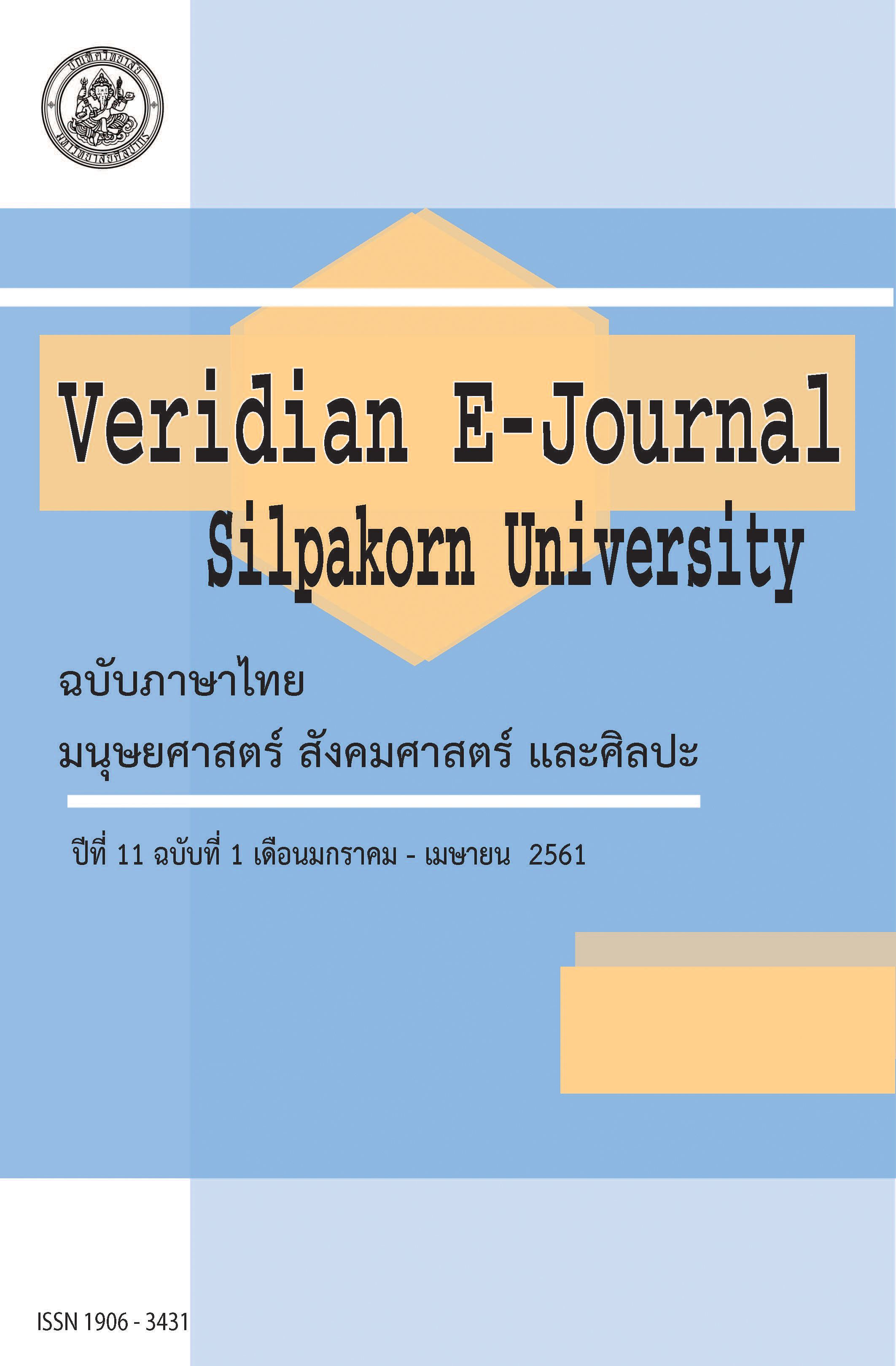ความสัมพันธ์เชิงสาเหตุของปัจจัยที่ส่งผลต่อความภักดีของผู้บริโภคร้านอาหารเพื่อสุขภาพ ในเขตกรุงเทพฯ (Causal Relationship of Factors that Affecting the Customer Loyalty of Healthy Restaurants in Bangkok)
Main Article Content
บทคัดย่อ
การวิจัยนี้มีวัตถุประสงค์เพื่อศึกษาและพัฒนาโมเดลความสัมพันธ์เชิงสาเหตุของปัจจัยที่ส่งผลต่อความภักดีของผู้บริโภคร้านอาหารเพื่อสุขภาพในเขตกรุงเทพฯ และตรวจสอบความสอดคล้องของตัวแบบความสัมพันธ์เชิงสาเหตุของปัจจัยที่ส่งผลต่อความภักดีของผู้บริโภค ร้านอาหารเพื่อสุขภาพในเขตกรุงเทพฯ ที่พัฒนาขึ้นกับข้อมูลเชิงประจักษ์ กลุ่มตัวอย่าง คือ ผู้บริโภค ร้านอาหารเพื่อสุขภาพในเขตกรุงเทพฯ จำนวน 240 คน สุ่มตัวอย่างโดยไม่ใช้ความน่าจะเป็น การเลือกตัวอย่างโดยบังเอิญ เครื่องมือที่ใช้ในการวิจัยเป็นแบบสอบถามเกี่ยวกับความสัมพันธ์เชิงสาเหตุของปัจจัยที่ส่งผลต่อความภักดีของผู้บริโภค ร้านอาหารเพื่อสุขภาพในเขตกรุงเทพฯ สถิติที่ใช้ในการวิเคราะห์ข้อมูลได้แก่ ค่าความถี่ ร้อยละ ค่าเฉลี่ย และส่วนเบี่ยงเบนมาตรฐาน สำหรับสถิติที่ใช้ในการทดสอบสมมติฐานคณะผู้วิจัยใช้ดัชนีชี้วัดความกลมกลืน ประกอบด้วย ค่าไค-สแควร์ ค่า GFI ค่า RMSEA และค่า CFI
ผลการศึกษา พบว่า ผู้บริโภคร้านอาหารเพื่อสุขภาพส่วนใหญ่ เพศหญิง อายุ 41-50 ปี ระดับการศึกษาปริญญาตรี อาชีพพนักงานบริษัท เมื่อพิจารณาถึงความคิดเห็นเกี่ยวกับคุณภาพการบริการ ผู้บริโภคให้ความสำคัญกับการให้ความมั่นใจ รองลงมา คือ ความน่าเชื่อถือหรือไว้วางใจได้ ในขณะที่ความคิดเห็นเกี่ยวกับความภักดีของผู้บริโภค ผู้บริโภคให้ความสำคัญกับความเชื่อมั่น เป็นลำดับแรก ลำดับต่อมาผู้บริโภคให้ความสำคัญกับ การเข้าไปอยู่กลางใจผู้บริโภค รวมถึงความคิดเห็นเกี่ยวกับความพึงพอใจของลูกค้า ผู้บริโภคให้ความสำคัญกับผลิตภัณฑ์ รองลงมาคือ ด้าน สถานที่จำหน่าย สำหรับผลการศึกษาความสัมพันธ์เชิงสาเหตุของปัจจัยที่ส่งผลต่อความภักดีของผู้บริโภค ร้านอาหารเพื่อสุขภาพในเขตกรุงเทพฯ เมื่อพิจารณาถึงความภักดีของผู้บริโภค ซึ่งเป็นผลลัพธ์สุดท้ายของโมเดล พบว่า ได้รับอิทธิพลรวมสูงสุดจาก ด้านคุณภาพการบริการ รองลงมา ความพึงพอใจของลูกค้า ตามลำดับ โดย ผลการวิเคราะห์ข้อมูลพบว่าค่าไค-สแควร์ (X2) มีค่า 29.38 มีนัยสำคัญทางสถิติที่ระดับ p-value = 0.29 ค่าไค-สแควร์สัมพัทธ์ (X2/df) = 1.13 ค่าดัชนีวัดความสอดคล้องกลมกลืนเชิงสัมพัทธ์ (CFI) = 1.00 ค่าดัชนีวัดระดับความกลมกลืน (GFI)= 0.98 ค่าดัชนีวัดระดับความกลมกลืนที่ปรับแก้แล้ว (AGFI) = 0.95 และค่ารากที่สองของค่าเฉลี่ยความคลาดเคลื่อนกำลังสองของการประมาณ (RMSEA) = 0.02 ซึ่งผ่านเกณฑ์ทุกค่า โดยผลการวิเคราะห์ความสัมพันธ์เชิงสาเหตุของปัจจัยที่ส่งผลต่อความภักดีของผู้บริโภคร้านอาหารเพื่อสุขภาพในเขตกรุงเทพฯ พบว่ามีความสัมพันธ์กัน
The purpose of this research were to study and develop the Causal Relationship Model of factors that affecting the customer loyalty of healthy restaurants in Bangkok, and inspect the accordance with the Causal Relationship Model of factors that affecting the customer loyalty of healthy restaurants in Bangkok that was developed with the empirical information. The sample group was the 240 customers of healthy restaurants in Bangkok randomized without using probability but selected accidentally. The tool that used in this research was the questionnaire about Causal Relationship of factors that affecting the customer loyalty of healthy restaurants in Bangkok. The statistics that used in data analysis were frequency, percentage, mean, and standard deviation. The statistics that researcher used in testing hypothesis consisted of Chi-Square, GFI, RMSEA, and CFI value.
The study result shown that most of the customers were female office worker at 41-50 years old with bachelor degree graduated. While considering the opinion about service quality, the customers were prioritizing about giving confidence, followed by reliability while the opinion about customers’ loyalty, they prioritized the confidence firstly followed by standing in their heart and also the customers’ feedback. The customers also were prioritizing in product followed by the location. For the study result of Casual Relationship of factors that affecting the customer loyalty of healthy restaurants in Bangkok, while considering the customers’ loyalty which was the final result of the model, it was found that the most influential factor was the service quality followed by the customer satisfaction respectively. The data analysis result show that the Chi-square value (X2) was 29.38 which was statistically significant level of p-value at 0.29 and the relative Chi-Square value(X2/df) was 1.13, the confirmatory factor analysis (CFI) was 1.00, Goodness of Fit Index (GFI) was 0.98, Adjusted Goodness of Fit Index (AGFI) was 0.95, and Root Mean Square Error of Approximation (RMSEA) was 0.02 that all values were passed. For causal relationship of factors that affecting the customer loyalty of healthy restaurants in Bangkok found to be Relationship.

